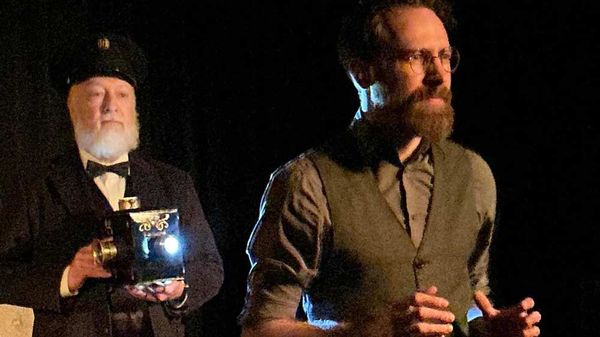March 30, 2011
Wittenberg
Jonathan Leaf READ TIME: 2 MIN.
The new play Wittenberg, presented by the Pearl Theatre company, is chockfull of clever lines.
I suspect that if its author, David Davalos, wanted he could be one of the higher-paid sitcom writers in Hollywood. Unfortunately, his aim in creating this comedy-drama about the meeting of two legendary characters -- Hamlet (Sean McNall) and Doctor Faustus (Scott Greer) -- with the indisputably real figure of Martin Luther (Chris Mixon) in early sixteenth century Wittenberg was only partly to ape Mel Brooks. It's also in some considerable measure to plumb the big ideas: cosmogony, life, death, fate, honor, love, sex, man and woman and the existence of God.
This is well-past Davalos's pay-grade.
It also leads to a two hour twenty minute drama (with intermission) that's at least forty-five minutes too long.
The Mel Brooks parody aspect of the play is what's best about it. This shows up before any lines are spoken when Hamlet appears on stage -- more than five hundred years after his supposed death -- wearing an IPod. This is not quite five hundred years before their actual invention. The impulse also reveals itself in Faustus's assertion that he can be excommunicated or burned at the stake but not fired as he has tenure.
The fourth player in the show is an actress (Joey Parsons) who must play both Helen of Troy and Faustus's beloved mistress, Gretchen. Parsons is sexy and spirited, but she's surely wrong in the part of the Brooklyn Decker of the ancient world. But how much does this miscasting really matter when the play is so full of intellectual ambition and yet so earth-bound in its attainments?
The author's inability to deal substantively with complex issues is perhaps best reflected in his treatment of the Copernican concept of the universe.
Even if we ignore the fact that Copernicus's ideas were unknown when Martin Luther presented his 95 Theses commencing the Protestant Reformation (as Davalos does) and these therefore could not have influenced Luther's writing, the playwright's treatment of the subject is still glib and dishonest -- and without being all that funny. Contrary to what the author suggests, Copernicus was never an advocate of the belief that the universe lacks a fixed center. Quite the opposite: he thought his heliocentric model was needed to emphasize the purity of this conception. This misunderstanding, whether purposeful or not, is typical of the play's odd habit of presenting serious ideas poorly and funny ideas lengthily.
Greer, in the role of Faustus, is a lively presence, and Mixon does his best at playing the square and humorless Luther, the show's straight man. But the soul of this play is far from immortal and cannot be saved by either from the flames. We must not be, so to speak, so quick with our indulgences.
Wittenberg continues through April 17 at City Center Stage II at 131 West 55th Street. For more information visit the Pearl Theatre Company website.
Jonathan Leaf is a playwright and journalist living in New York.







